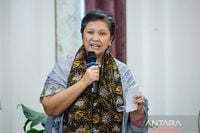On April 2, 2025, Lestari Moerdijat, the Deputy Chair of the People's Consultative Assembly (MPR) of Indonesia, called for local governments (pemda) to actively promote the new student admission system, known as Sistem Penerimaan Murid Baru (SPMB), for the upcoming school year. This initiative aims to minimize potential obstacles as families prepare for the new academic year.
Moerdijat emphasized the importance of clear communication, stating, "I think local governments must proactively socialize the new SPMB so that parents understand the stages they must go through to register their children for the upcoming school year." This proactive approach is essential to ensure that parents are well-informed about the requirements and processes involved in enrolling their children.
As part of this new system, the Ministry of Education and Culture (Mendikbud) has outlined four distinct pathways for student admission. These pathways include the domicile route, which is designed for students residing in the vicinity of the school, the achievement route for students with notable academic or non-academic accomplishments, the affirmation route aimed at assisting students from disadvantaged backgrounds and those with disabilities, and the mutation route for students relocating due to their parents' job transfers.
Moerdijat urged local governments to establish and communicate the specific requirements for each pathway in a transparent manner. She stated, "A number of requirements for each pathway must be implemented transparently by the local governments." This transparency is crucial to avoid confusion and ensure that all families have equal access to educational opportunities.
In her statement, Moerdijat expressed hope that the new SPMB policies would facilitate easier access to educational services for the public. She noted that as more children gain access to education, the potential for improving the quality of Indonesia's human resources (SDM) increases. "Certainly, with improved SDM quality, the competitiveness of our children on a global scale will also enhance," she added.
Previously, Mendikbud Abdul Mu'ti had confirmed the implementation of the four pathways in the SPMB policy, which is set to take effect in the 2025/2026 academic year. This new framework represents a significant step towards reforming Indonesia's educational system to be more equitable and accessible.
As the new school year approaches, the emphasis on socializing the SPMB is expected to play a crucial role in ensuring that parents and prospective students are adequately prepared. Local governments are being called upon to take immediate action in this regard, ensuring that the guidelines and requirements are clear and accessible to all.
The introduction of the SPMB system is seen as a pivotal move in addressing educational disparities in Indonesia. By offering multiple pathways for admission, the government aims to cater to a diverse range of student needs and backgrounds. This approach not only promotes inclusivity but also seeks to enhance the overall quality of education in the country.
As families begin to navigate the new admission process, the call for transparency and proactive communication from local governments remains paramount. The effectiveness of the SPMB will largely depend on how well these entities engage with the community and convey essential information regarding the registration process.
In conclusion, the proactive measures urged by Lestari Moerdijat highlight the importance of collaboration between local governments and families in facilitating a smooth transition into the new academic year. As Indonesia continues to strive for educational reform, the successful implementation of the SPMB will be a critical factor in shaping the future of the nation's education system.







